On 4 October, twenty thousand Georgians tried to storm the presidential palace in what they called the "Revolution of Flags" in response to contested elections securing the pro-Russian party's grip even further.
Three days later, the regime charged five opposition leaders with attempting a coup d'état—crimes carrying up to nine years in prison. One of them, 70-year-old opera star Paata Burchuladze, was arrested in a hospital intensive care unit where he was recovering from a heart attack.
Prime Minister Irakli Kobakhidze's warning was clear: "No one will go unpunished."
It marked an escalation in Europe's longest continuous daily protest—over 300 days and counting. And while the world watched Ukraine fight Russia's military invasion, Georgia was falling to a different kind of conquest.
It was in February 2022 that Bidzina Ivanishvili—Georgia's billionaire shadow ruler—made his bet. Russia would crush Ukraine in days, maybe weeks. Better be on the winning side. He'd made his $7 billion fortune in 1990s Russia and learned one lesson: always bet on Moscow.
Three years later, Ukraine still fights. And Georgia is quietly slipping into Russia's orbit without a single Russian soldier crossing the border.

Georgian protesters give government ultimatum after watching Moldova defeat Russia—all five leaders arrested
Euromaidan Press spoke with two Georgian voices on the front lines of this struggle: Marika Mikiashvili, Foreign Secretary of the opposition party Droa, Coalition for Change and lecturer at Alte University in Tbilisi, and Aka Zarkua, executive editor of Realpolitika. Their accounts reveal a strategic disaster unfolding in their country.
Two post-Soviet democracies, two opposite bets
Georgia and Ukraine were supposed to be the same story—post-Soviet democracies that chose Europe over Moscow. Both applied for NATO membership. Both signed EU association agreements. Both got invaded by Russia, testing Western resolve.
But their paths diverged completely in February 2022.
| Georgia (2008) | Ukraine (2014, 2022) |
| 5-day war, 20% territory occupied | Ongoing war since 2014, full-scale invasion 2022 |
| Oligarch chose accommodation | Society chose resistance |
| Slipping into Russian orbit | Fighting to prevent conquest |
Ukraine's unexpected resistance trapped Georgia's oligarch on the wrong side of history. Now, as Ukraine bleeds to stop Russian expansion, Georgia is handing Moscow a strategic victory without firing a shot.
"It's thanks to Ukraine's heroic fight—Russia is just distracted from our region, from the Caucasus at this moment," Mikiashvili says.
If Ukraine falls, Georgia is next. And this time, Russia won't need to invade.
322 days: Europe's longest daily protest you've never heard of
While the world's eyes were fixed on Ukraine, Georgians have been protesting daily for 322 consecutive days—the longest continuous daily protest in modern European history.
"It's unprecedented," Mikiashvili says. Other major resistance movements had sporadic demonstrations or weekend rallies, but nothing sustained and daily for this long.
What makes the Georgian protests unprecedented:
- Daily protests for 315+ consecutive days
- 100,000 people in recent rallies (Georgia's population: 3.7 million)
- 9 of 11 top opposition leaders now imprisoned
- Systematic torture without fatalities (regime avoids creating martyrs)
- Financial strangulation of NGOs and independent media
"Stereotypically, people used to say that Georgians cannot show much endurance, they need things to happen fast, otherwise they get tired and go home," Mikiashvili notes. "So, this is remarkable."
"Out of 10 or 11 most prominent democratic leaders, nine are in jail," Mikiashvili confirms. "It is absolutely crazy. It gets worse and worse every single day."
How one oligarch owns a third of Georgia's economy
Bidzina Ivanishvili's wealth equals roughly a third of Georgia's entire economy—the highest oligarch-to-GDP ratio anywhere on Earth.
| Oligarch | Personal Wealth | Country GDP | Ratio |
| Bidzina Ivanishvili | $6-7 billion | ~$24 billion | ~29% |
| Elon Musk | ~$200 billion | ~$25 trillion | ~0.8% |
"Bidzina Ivanishvili has his net worth estimated at between $6 billion, $7 billion," explains Aka Zarkua, a Georgian journalist tracking the regime's evolution. "And if you compare this to the country's GDP, he's number one by far. In the United States, even the richest person's wealth is nothing compared to the GDP. But in Georgia, it's close to one third."
Even Elon Musk's fortune is a rounding error compared to America's economy. Ivanishvili's wealth is the Georgian economy.
How he made his fortune:
He made that money in Russia during the 1990s, the Wild West of capitalism—financing presidential campaigns and cultivating relationships with Russian generals like Alexander Lebed, the commander who led forces in Moldova's Transnistria conflict.
"Ivanishvili was a high-profile figure in 1990s Russia," Zarkua notes. "He financed Lebed's presidential election in 1996 and his Krasnoyarsk gubernatorial campaign. And he admitted this."
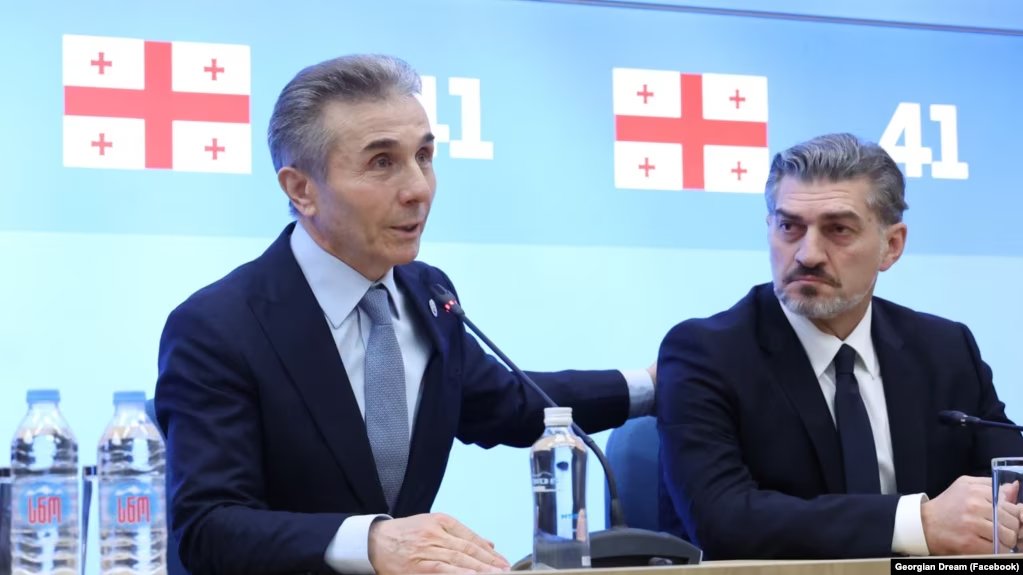
Ivanishvili stayed carefully low-profile during the oligarch wars—avoiding the conflicts that destroyed Khodorkovsky and Berezovsky—and survived to build his fortune. In 2012, he moved into Georgian politics, forming a coalition that defeated the pro-Western government in the country's first democratic transfer of power.
For the next decade, he officially maintained Georgia's European trajectory. EU association agreement. Visa-free travel to Europe. Democracy, on paper. But when Russia invaded Ukraine in February 2022, Ivanishvili showed where his real loyalties lay.
February 2022: the bet that trapped an oligarch
"The situation changed in 2022," Zarkua says. "Bidzina Ivanishvili decided that Russia is going to win, Russia is going to win fast. So he decided that he needed to be on the winning side, to be in the right place at the right time—and made this bet."
The calculation was simple: Russia wins fast, Ukraine becomes a puppet state, better align with Moscow now and reap the benefits. Everyone from American generals to European intelligence agencies predicted Kyiv would fall within days.
Except Ukraine didn't fall. And now Ivanishvili is trapped.
"He bets completely on Russian victory," Mikiashvili says. "His mentality just does not allow for the possibility that Russia might lose the war, because he feels that Russia is invincible and the West is an idiot, just like Russian propaganda says."
Three years later, with Ukraine still fighting and Russia burning through Soviet-era tank stockpiles, he can't back out without losing everything.
"Former Russian oligarchs don't exist," Mikiashvili points out. "He made money in the 1990s in Russia."
So instead of admitting the mistake, he's systematically dismantling what's left of Georgian democracy to prove his loyalty to Moscow.
How the Ukraine war is making the oligarch richer
Ivanishvili is actually getting richer from the Ukraine war.
"He's helping Russia with sanctions evasion," Mikiashvili explains. "Georgia and the Georgian Dream economically benefits from the war in Ukraine, because it helps Russia evade sanctions."
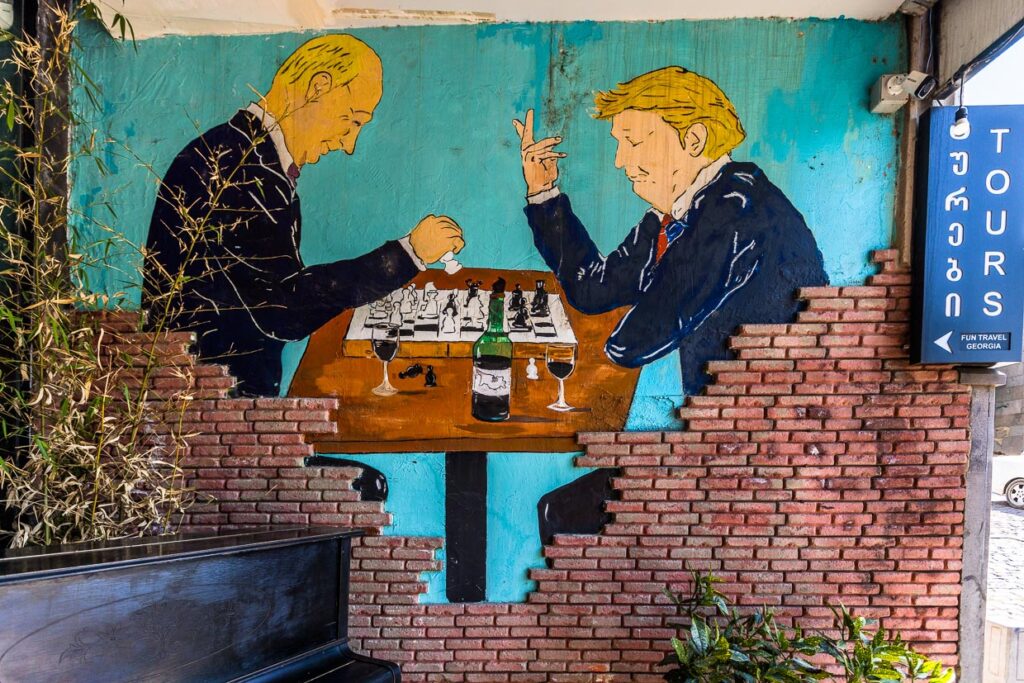
The Georgian sanctions evasion evidence:
- Double-digit economic growth in Georgia over last 2 years
- Exports to Kazakhstan/Kyrgyzstan skyrocketed (classic rerouting)
- Black economy influx, including narcotics trafficking
- Russian tourism surge, including relocated Russians
"There's a lot of what we call black economy influx into Georgia, all the rerouting of trafficking, narcotics," Mikiashvili continues. "And also Georgia's exports to Kazakhstan and Kyrgyzstan just skyrocketed. And that is very, very clear evidence of sanctions evasion."
While Western sanctions aim to weaken Russia's war economy, they're accidentally enriching Georgia's pro-Russian regime. Russia gets sanctions relief, Georgian Dream pockets the profits, and democracy dies. The regime uses this war-fueled wealth to fund systematic repression—torture, imprisonment, suffocation of NGOs and independent media.
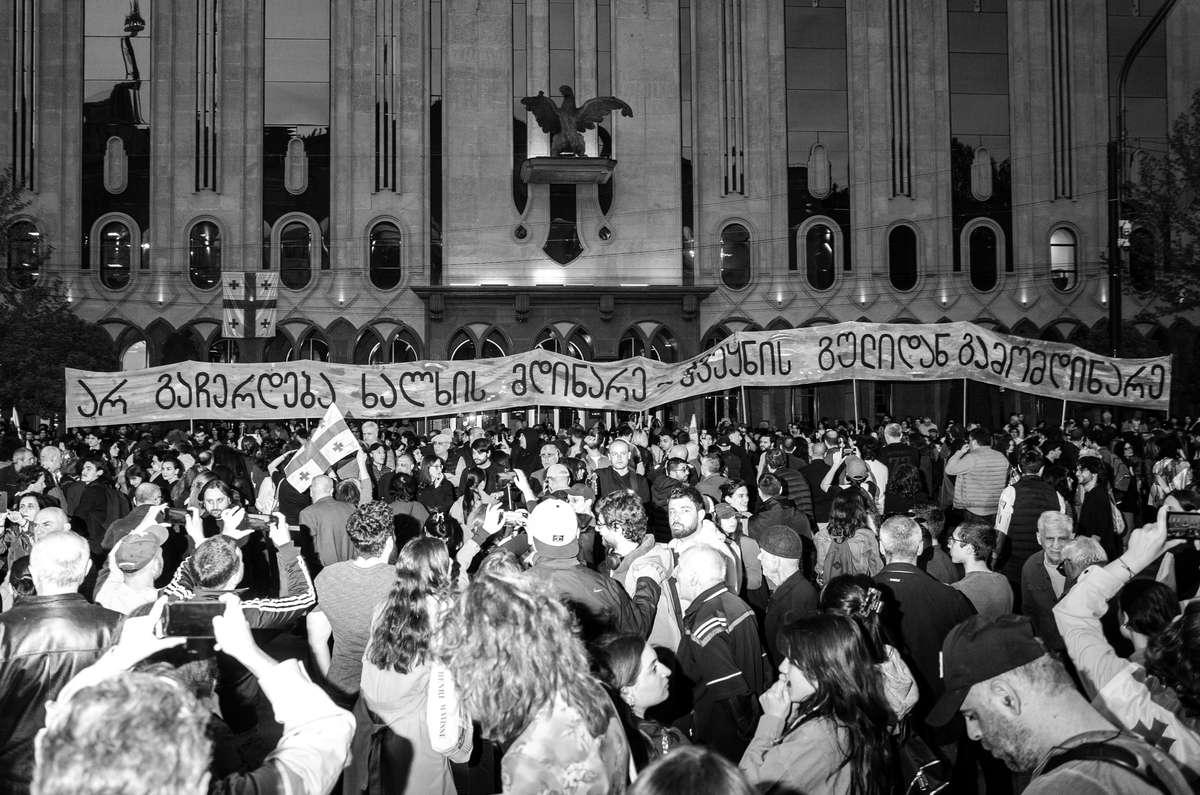
From Rose Revolution to “Russian Dream”: Georgia at breaking point with pivotal pro-EU protests
Why an unpopular regime still holds power
"The Georgian Dream does not have many enthusiastic supporters," Mikiashvili says. "Their supporters are mostly bureaucracy, business sectors that would back any government. So, if the regime were to change tonight, they would likely back the new government tomorrow."
But enthusiasm isn't what keeps authoritarian regimes in power. Ivanishvili commands resources no opposition can match.
The Georgian regime's power base:
- $7 billion personal fortune plus state budget control
- 35% of GDP when he took power (2012), still 25% today
- No competing oligarchs, unlike Ukraine's multiple power centers
- 2008 war trauma exploited to threaten Russian invasion
- 80-85% popular support for EU forces regime to lie about intentions
"In Georgia, unlike in Ukraine, there has only been one oligarch, the dictator oligarch Bidzina Ivanishvili," Mikiashvili notes. "In Ukraine, the multiplicity of financial interests still checks and balances each other. And in Georgia, there's no one to check and balance. He's just one."
Zarkua adds context: "When Ivanishvili came to power in 2012, his personal assets were 35% of Georgia's GDP. Now it's around 25%. Nevertheless, imagine all his networks, systems, and people. Georgian people and civil society and political parties—we fight with Russia with bare hands."
The regime also exploits Georgia's trauma from the 2008 war. "Georgia is a traumatized country by war, and particularly with Russia," Zarkua explains. "The last war didn't last long; it was like four or five days, but it was hugely traumatic."
"He exploits this fear in his favor," Zarkua continues. "And he says, if I'm not in power, Russia will invade here. Look at the opposition. They couldn't avoid the war in 2008. So keep me in power if you don't want to see what you are seeing in Ukraine—burned cities, daily bombardments."
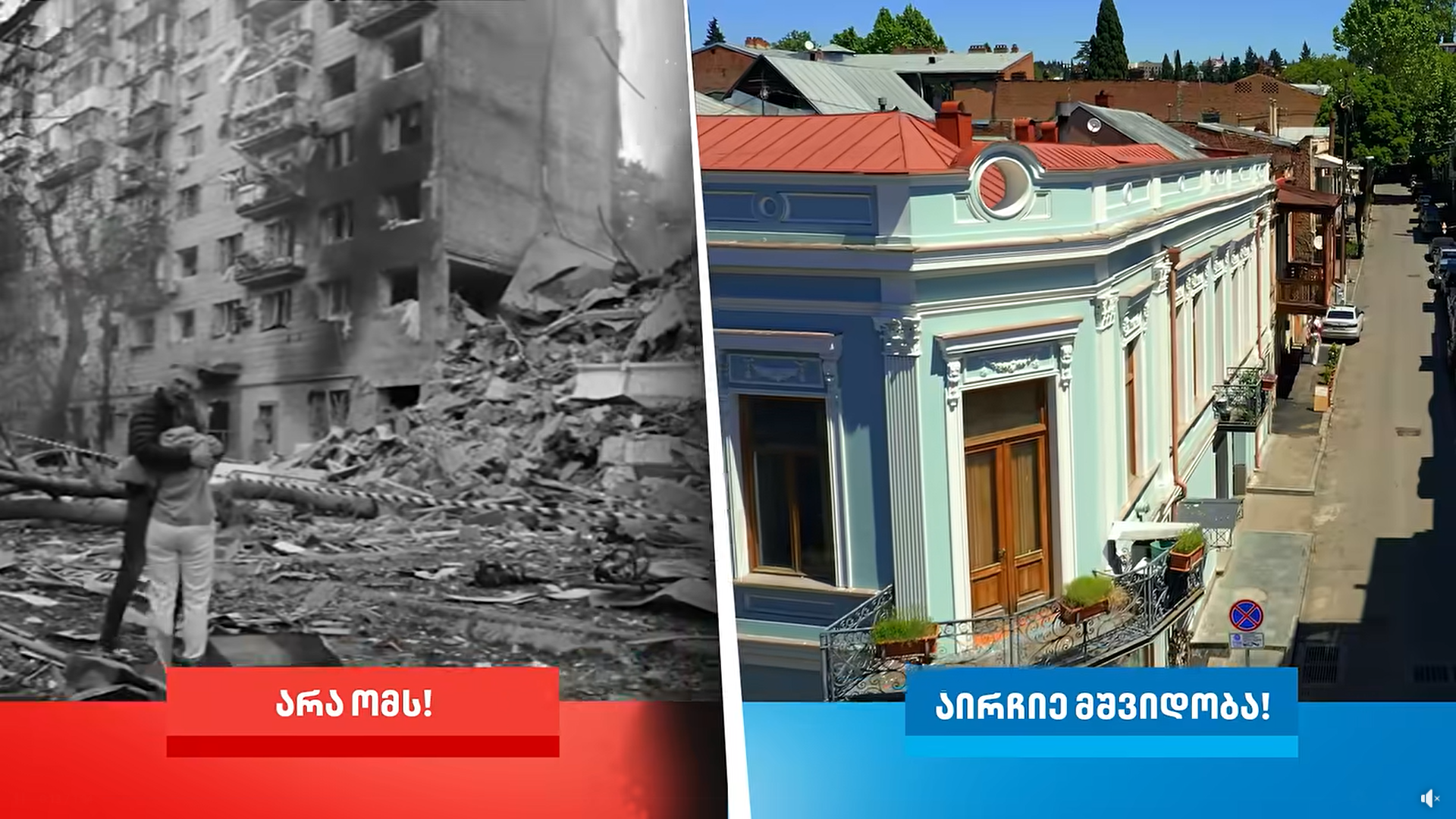
Georgian ruling party using Ukraine’s war destruction as campaign material, “crawling before Moscow”
Yet Georgian society won't accept openly anti-European positioning. This forces the regime into absurd rhetorical positions—claiming they want EU membership while systematically destroying the democratic reforms that would make membership possible.
"The Georgian Dream [has to say] that we want to be part of the EU," Zarkua explains. "But they are now saying that the problem is this European bureaucracy that is controlled by a deep state. Basically, they are repeating Russian narratives about this war."
Torture without martyrs: the exhaustion warfare playbook
The regime learned from Belarus's 2020 mistakes. When Lukashenko violently crushed protests, he created martyrs and triggered international outrage. Georgian Dream is more sophisticated.
"The Georgian Dream is actively avoiding fatalities because it knows that in case there's a fatality, they might be brought down overnight," Mikiashvili explains. "I remember testimonies from people tortured in November and December. They were tortured to near death, but then another policeman would come in and stop the one who was beating them. 'Stop, stop, stop, he's already dying.' So they are careful in that regard."
The Georgian regime's tactics:
- Torture to near-death, but stop before creating martyrs
- Systematic imprisonment of 9 of 11 opposition leaders
- Financial strangulation of NGOs and independent media
- Drain opposition resources through fines and legal harassment
- No dramatic crackdown that would trigger international response
The regime's bet is simple: maintain pressure long enough without creating martyrs, and eventually people give up. Financial exhaustion. Physical exhaustion. Emotional exhaustion.
Except after 315 days, Georgians haven't given up. "After a year of torture, systemic torture, repressions, financial terror, imprisonment, everything they could throw at people, there were still 100,000 people in the streets," Mikiashvili recounts. "And Georgia's population is just 3.7 million."
That 100,000 figure carries weight. These aren't fresh protesters responding to a new outrage—these are people who've watched friends get tortured, seen leaders imprisoned, felt the financial squeeze, and still show up every day.
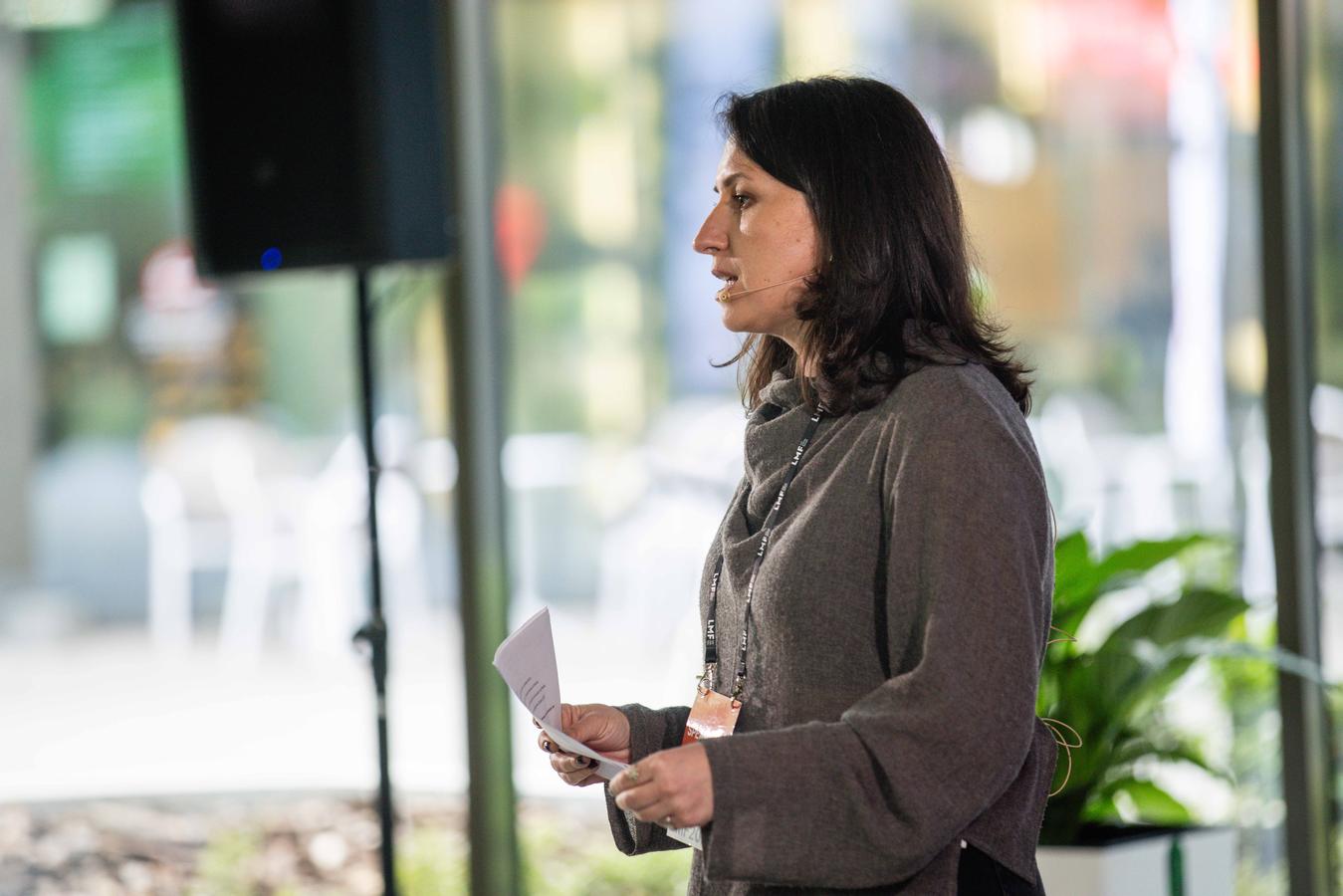
“I was not fierce enough”: Georgian activist’s brutal confession as democracy collapses
The Belarus lesson: why leaders chose prison over exile
Jailed leadership might sound like defeat. But it's actually a strategy—one that learned from Belarus's failures.
| Belarus 2020 | Georgia 2024-2025 |
| Leaders fled to exile in Europe | Leaders stayed, accepted imprisonment |
| Tried to govern from abroad | Maintained ground-level legitimacy |
| Lost effectiveness over time | Second/third layers continue fight |
| Regime consolidated power | Regime still unstable after year |
"In Belarus, opposition leaders fled to Europe and tried to govern in exile," Zarkua notes. "Considering what they managed to do to the Belarusian opposition, it's not so much effective."
The Georgian opposition made the opposite bet: stay, get jailed, maintain legitimacy on the ground. "All other leaders are currently in jail," Zarkua confirms. "And the second layer, the third layer of leaders and party people, they are in Georgia. They are very determined to be there, to push through, to fight there."
Physical presence—even from behind bars—matters more than freedom in exile. The lesson: Belarusian opposition lost effectiveness by leaving. Georgian opposition maintains legitimacy by staying, even in prison.
Russia's strategic corridor: Belarus, Georgia, and the Ukraine lynchpin
Three countries. Three different methods. One Russian strategy.
- Belarus: Complete control via direct Russian backing of Lukashenko
- Ukraine: Military conquest attempt—ongoing, unresolved
- Georgia: Oligarchic capture without invasion
"Russia will do anything to maintain them in power," Mikiashvili warns. "I wouldn't exclude them from doing literally anything. It's thanks to Ukraine's heroic fight—Russia is just distracted from our region, from the Caucasus at this moment."
Look at a map. If Russia controls all three countries, it completes a strategic corridor from Eastern Europe through the Black Sea to the Caucasus. This isn't just about those three countries—it reshapes the entire region's geopolitics.
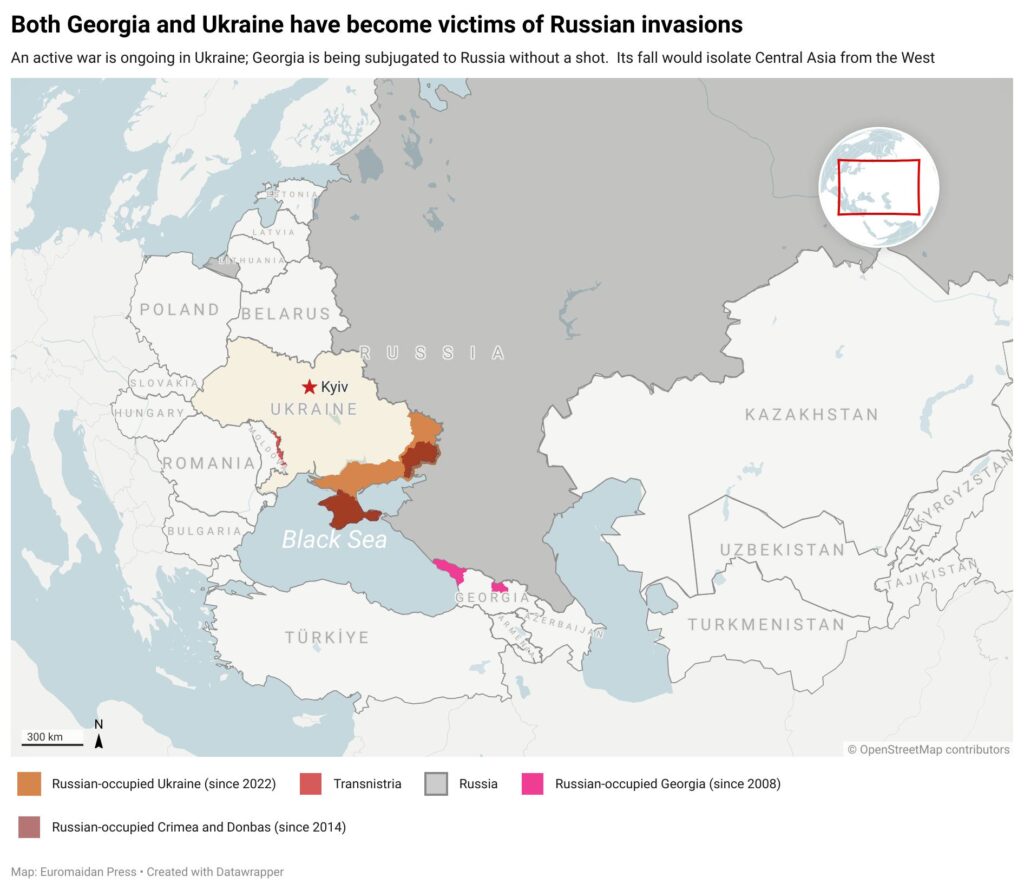
What Russia gains if all three fall:
- Strategic corridor from Eastern Europe through Black Sea to Caucasus
- Central Asia cut off from Western access
- Energy/transport routes that bypass Russia disappear
- Türkiye strategically isolated
- NATO expansion permanently blocked
Central Asia currently maintains some independence precisely because there are multiple routes to Europe—through the Caucasus, around the Caspian, through Türkiye. If Russia controls Georgia, those routes become vulnerable.
Countries like Kazakhstan and Azerbaijan suddenly have to route everything through Russian-controlled territory or not at all.
Energy routes matter even more. The Baku-Tbilisi-Ceyhan pipeline, which carries Azerbaijani oil to Türkiye and European markets, runs directly through Georgia. The Southern Gas Corridor, which brings natural gas from Azerbaijan to Europe while bypassing Russia, depends on Georgian territory.
If Russia controls Georgia through a proxy regime, these pipelines don't need to be shut down—the threat alone changes the negotiating position of every country involved.
Türkiye becomes strategically isolated on its eastern flank. NATO's southern anchor suddenly faces Russian-controlled territory across its entire northern and eastern borders. The Black Sea becomes a Russian lake.
"Russia knows that they are their last ever government in Georgia," Mikiashvili emphasizes. "Because after them, there is no social, political, cultural foothold that Russia can have in Georgia anymore. Even though they never came as a pro-Russian party. They're the Kremlin's most successful Trojan horse operation because they came as pro-Europeans."
"If the Georgian Dream gets to stay in power, there won't be any Georgia even anymore, let alone European Georgia."
What three decades of Western investment is buying now
The United States invested over three decades in building Georgian democracy. Billions in aid. Training programs for civil society. Support for independent media. Military cooperation. Economic development. Democratic institution building.
Now that investment faces extinction.
"Georgian civil society organizations, independent media, and political parties extremely urgently need funds to survive," Mikiashvili pleads. "For Western countries, it's not much money. But for Georgia, even small amounts of maintenance funds can be a game changer because the regime has suffocated all financial resources of the resistance movements."
"They could do national sanctions, like French, German, Italian, like a coalition of the willing," Mikiashvili says. "These sanctions and also what we need are European institutions that have long promised to support civil society organizations. I think where there's a will, there's a way."
How the regime is strangling civil society
Georgian Dream studied how to crush civil society without triggering international outrage. The new legal framework gives them everything they need.
The Georgian Dream's suffocation toolkit:
- Financial asset seizure: Can freeze bank accounts at will
- Crushing fines: Tens of thousands of lari (thousands of dollars) that bankrupt NGOs
- Information demands: Comprehensive financial inquiries that drain resources
- Permission requirements: Government approval needed for foreign grants
- Legal harassment: Continuous pressure with no way to "buy off" compliance
"They have this fundamental repressive apparatus," Zarkua explains about the new legal framework. "So there is nothing between these laws and changing these laws for their purposes ad hoc. They can deprive you of your financial assets, or they can freeze your assets in Georgian banks. They have the right to inquire about your whole financial information, even personal financial information."
The toolkit is comprehensive but the real genius is in how it's deployed. The regime doesn't just fine organizations once and move on. They create a legal trap.
"Fines are really, really huge. It's like tens of thousands of lari, equivalent to thousands of dollars," Zarkua continues. "It's really unimaginable for even a small or quite large NGO to pay these fines. And even if you pay this fine one time, and if you continue your work, it's a trap, you know. I mean, you can't just buy them off. So it's a situation where you are squeezed from all sides."
Organizations are already buckling. The Georgian Institute of Politics—one of the country's most respected policy research centers—stopped operations entirely. It is virtually impossible to run a Georgian-registered NGO, as receiving foreign grants without government permission has become impossible.
The only survival strategy requires sophistication most organizations lack: registering companies abroad, finding legal loopholes, making complex financial arrangements through third countries. "So it's really, really difficult and not all—even I would say the majority of Georgian NGOs are not able to do this," Zarkua says.
The asymmetry is absolute: the regime controls the legal framework and can change it at will. Civil society has to navigate it—always one step behind.
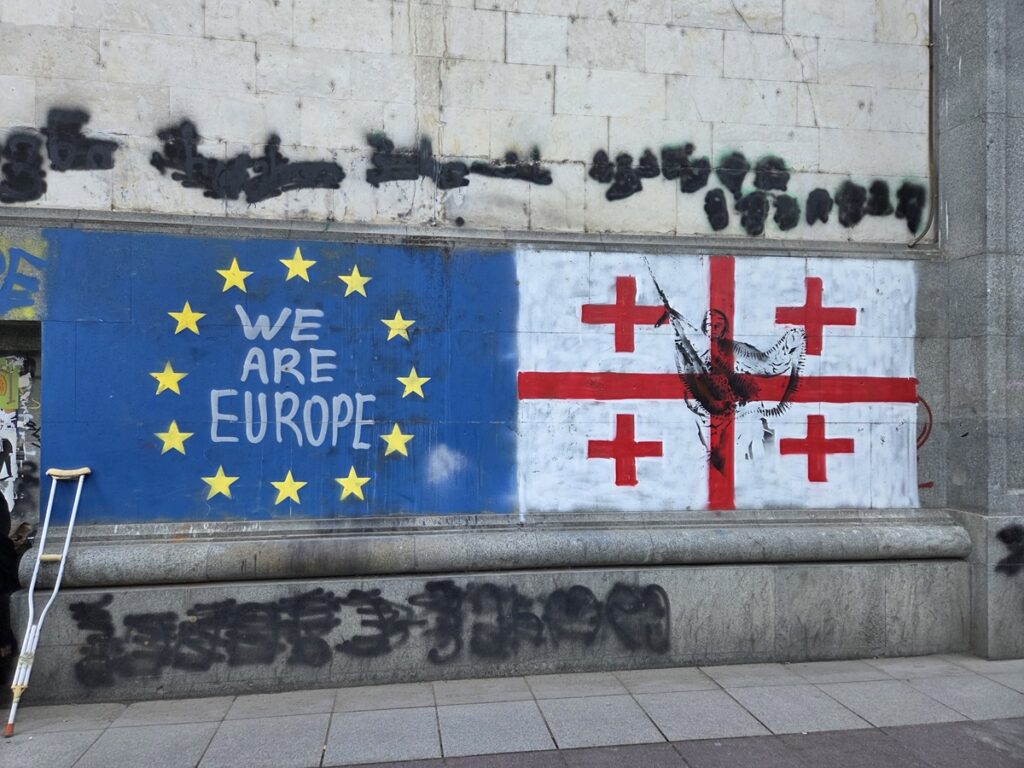
The opposition's three-pillar strategy
Despite jailed leaders and systematic repression, the opposition maintains a clear strategy designed to exploit the regime's weaknesses.
The three pillars of the Georgian opposition:
- Isolation (domestic and international)
- Non-violent protests (diversified, sustained)
- Targeted sanctions (regime figures and their families)
All designed to exploit the regime's weaknesses without giving them an excuse for a violent crackdown that would create martyrs and trigger stronger international response.
"Everyone in Georgia agrees that the regime is much weaker than they were a year ago," Mikiashvili says. "Their internal clan struggles are a problem. Sanctions and international isolation are both significant problems. They are at each other's throats for real."
But weakness doesn't mean imminent collapse. "Right now, there's this period when the regime feels like they have momentum to push and to hopefully break us," Mikiashvili acknowledges.
The opposition is betting on endurance. "In the worst-case scenario, it can drag out for some time, but they will never be able to stabilize a dictatorship in Georgia. They will never feel confident in their governance."
Ukraine's resistance is buying Georgia time
Ukraine's continued resistance is literally buying time for Georgia. Every day Ukrainian soldiers hold the line is another day Georgian civil society survives. Every Russian casualty in Donbas is one less resource available for consolidating control in Tbilisi.
If Ukraine falls or if Russia calculates it can handle both fronts simultaneously, Georgia faces a vastly different situation. The regime would get direct Russian support for consolidation. The resistance would face not just Georgian Dream's resources but Moscow's full backing.
"Georgian society is very sophisticated," Mikiashvili insists, pushing back against narratives that Georgia needs to "develop" before joining Europe. "It's just the regime dragging us back. Once we get rid of them, I'm sure that Georgia will be very fast in reforms."
The precedent exists. Georgia has been here before—a thriving democracy, a rapid reformer, and a model post-Soviet state. The institutions and knowledge haven't disappeared. They're just suppressed.
But timing matters. The EU enlargement window may not remain open indefinitely. If Georgia can survive until that window, and if Ukraine's outcome creates strategic space, then rapid democratic recovery becomes possible.
The bottom line: resistance works, accommodation fails
Three years ago, two pro-Western democracies faced Russian pressure. One chose resistance. The other's oligarch chose accommodation.
"The Georgian Dream says, look, Ukraine is ruined," Zarkua explains the regime's propaganda. "And they are discrediting the idea of resistance at the core. They are saying that it's not justified to mount a resistance when you, before the fight, know the result, that you will lose."
That ideology—resistance is futile, accommodation is wisdom—is what Georgian Dream offers. It's what Ivanishvili bet on when he calculated Russia would win.
The problem is that Ukraine has shown resistance works. Three years later, Kyiv still stands. And Ivanishvili is trapped with his losing bet.
Against that fatalism, 100,000 Georgians have marched daily for 315 consecutive days. Nine leaders sit in jail. Civil society runs on fumes. But they haven't stopped.
"People are enduring and they will not be silenced," Mikiashvili says.
The question is whether the West provides the minimal support needed for civil society to survive. The question is whether Ukraine's resistance buys enough time for Georgia's window to reopen.
"For Western countries, it's not much money," Mikiashvili pleads one more time. "But for Georgia, even small amounts of maintenance funds can be a game changer."
The domino that fell while everyone watched Ukraine is still falling.
The question is whether anyone looks up in time to catch it.



